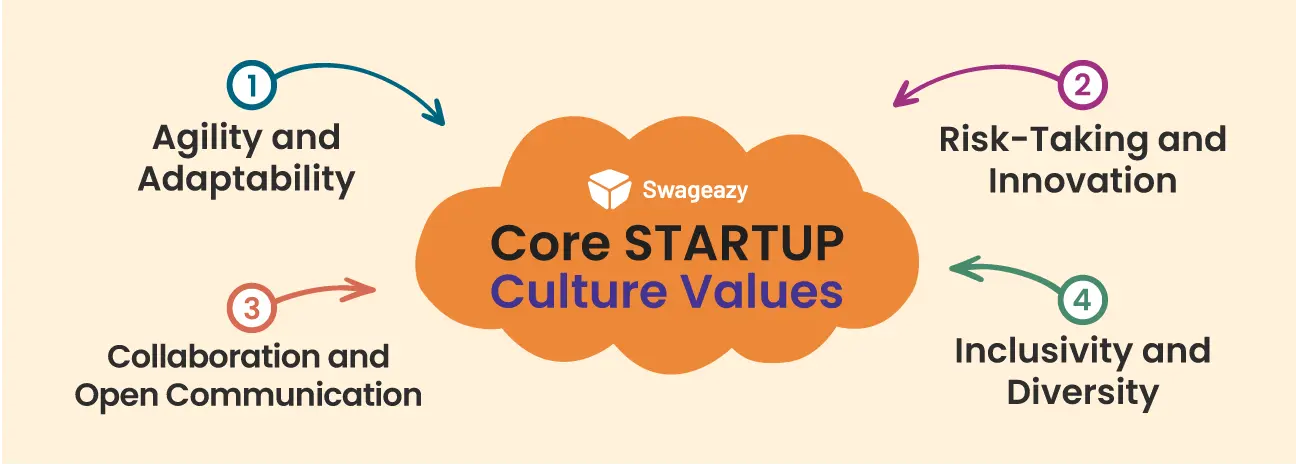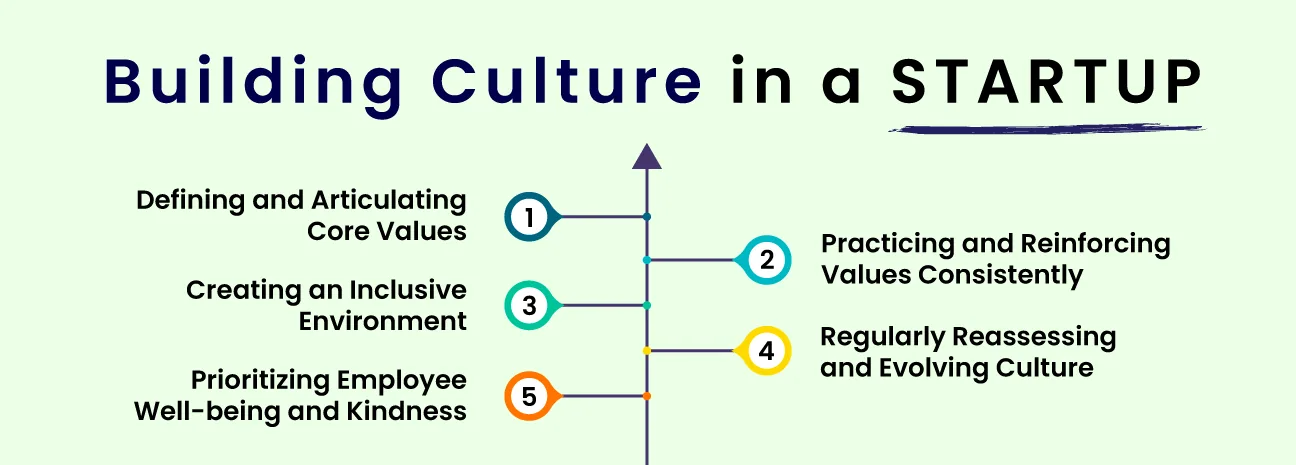
Understanding Startup Culture and How to Build It
"Startup culture" often conjures images of open-plan offices, casual dress codes, and ping-pong tables. However, authentic startup culture goes far beyond these surface elements.
A healthy mix of shared values, beliefs, and practices shape a startup's growth. Understanding and intentionally crafting this culture is crucial for any startup aiming to attract talent, encourage innovation, and achieve long-term success.
In this blog, we'll delve into the essence of startup culture and provide insights on how to build a thriving and cohesive workplace environment.
What is Startup Culture?
Startup culture is the specific way of thinking, feeling, perceiving, and acting within and regarding a startup.
A startup's culture differs from a conventional corporate world since it is more fluid, relaxed, and creative.
Some essential features include decentralization of operation, a strong inclination towards innovation and solving puzzles, and working in groups and sharing ideas.
Role in Shaping the Startup Environment
Culture is another critical factor that defines the environment of a startup to a very large extent. It affects all the activities within an organization and its interactions with the customers, including decisions made by employees and how customers perceive the brand.
A good and clear startup culture can attract the best employees, increase their motivation, and make them feel that they are part of a team with a common goal. It also promotes and rewards the passion for risk-taking and innovation, which are crucial in the cutthroat world of start-ups.
Examples of Successful Startup Culture Values
Successful startups often embody specific cultural values that align with their mission and vision. Here are a few examples:
Successful startups often exemplify core values that drive their success. For example, companies like Google and SpaceX prioritize innovation, encouraging employees to explore new ideas and think creatively.
Buffer is known for its radical transparency, sharing of company finances, and decision-making processes to build trust.
Customer-centricity is a hallmark of Zappos and Amazon, where a focus on customer satisfaction is embedded in every operation.
Startups like Slack and Airbnb emphasize agility, enabling them to adapt quickly to market changes and new opportunities. These values—innovation, transparency, customer-centricity, and agility—are essential for fostering a dynamic and successful startup culture.
Why Startup Culture Matters
In the dynamic landscape of startups, culture isn't just a backdrop; it's a driving force that can shape the company's future.
Understanding why startup culture matters is crucial for any entrepreneur or business leader looking to build a thriving organization.
Impact on Employee Engagement and Retention
One key reason startup culture is so influential is its impact on employee engagement and retention. When employees are aligned with the company's values and feel a sense of belonging, they are more likely to be engaged and committed.
A positive work environment emphasizing open communication, recognition, and personal growth opportunities can lead to higher job satisfaction and lower turnover rates. This creates a stable and motivated workforce that can propel the company forward.
Influence on Innovation and Collaboration
Startup culture also plays a critical role in fostering innovation and collaboration. In an industry that requires agility and creativity, a culture that supports experimentation and embraces people’s differences is a strong advantage.
Ideas are generated when employees are free to take risks and develop new ideas. Also, when knowledge sharing and teamwork are promoted, problem-solving becomes more efficient, and the approach to achieving organizational objectives is consistent.
Contribution to Overall Business Success
Ultimately, the strength of a startup's culture can determine its overall business success. A well-defined culture enhances the company's reputation and brand identity and attracts customers and investors.
It builds loyalty among employees and customers, creating a community supporting the company's mission.
This foundation of shared values and purpose is crucial for achieving sustainable growth and navigating the challenges of a competitive market.
Core Startup Culture Values
Building a solid startup culture involves embracing core values that shape the company's ethos and day-to-day operations.
These values not only define how employees interact with each other but also influence the overall direction of the business.
Let's explore some of the fundamental values that are often central to successful startup cultures.

Agility and Adaptability
Agility and adaptability are essential in the fast-paced world of startups. These values emphasize the importance of being responsive to change and willing to pivot when necessary.
Conditions can shift rapidly in a startup environment, and the ability to adapt quickly can mean the difference between success and failure.
Risk-Taking and Innovation
Risk-taking and innovation go hand in hand in a startup setting. A culture that supports risk-taking fosters an atmosphere where employees feel empowered to experiment and explore new possibilities.
This willingness to take calculated risks is often the breeding ground for innovative ideas and solutions. By valuing innovation, startups can differentiate themselves in the market and stay ahead of the competition.
Encouraging a mindset that views failure as a learning opportunity rather than a setback is crucial for continuous improvement and growth.
Collaboration and Open Communication
Collaboration and open communication are cornerstones of a cohesive and effective startup culture. Encouraging employees to share their thoughts and ideas freely leads to a more inclusive decision-making process and vital teamwork.
Open communication helps build trust and ensures everyone is aligned with the company's goals and objectives.
This collaborative spirit enhances productivity and fosters a sense of community and shared purpose within the organization.
Inclusivity and Diversity
Inclusivity and diversity are increasingly recognized as vital to a thriving startup culture. A diverse workforce brings many perspectives, experiences, and ideas, which can lead to more creative and innovative solutions.
Inclusivity ensures that all employees feel valued and respected, regardless of their background or role within the company.
By fostering an inclusive culture, startups can attract a broader talent pool and create a more dynamic and resilient organization.
Building Culture in a Startup
Establishing a strong and positive culture is crucial for any startup, as it lays the foundation for long-term success.
Here are some essential steps and considerations for building a thriving startup culture:

Defining and Articulating Core Values
The first step in building a solid culture is clearly defining and articulating the core values guiding the company's actions and decisions.
These values should reflect the startup's mission and vision and be communicated consistently across all levels of the organization.
Founders and leaders play a crucial role in embodying and promoting these values, setting an example for others.
Practicing and Reinforcing Values Consistently
More than core values are needed; they must be practiced and reinforced consistently. Integrating them into everyday activities, decision-making processes, and company policies.
Leaders should regularly highlight and reward behaviors that align with the company's values, creating a culture of recognition and accountability. The startup can build a cohesive and authentic culture by consistently living out these values.
Creating an Inclusive Environment
Creating an inclusive environment fosters employees' sense of belonging and respect. This involves actively promoting diversity and ensuring that different voices and perspectives are heard and valued.
Inclusive practices include diverse hiring strategies, inclusive communication styles, and providing equal opportunities for growth and development. An inclusive culture enhances employee satisfaction and drives innovation and creativity.
Regularly Reassessing and Evolving Culture
As startups grow and evolve, so too should their culture. Regularly reassessing and adapting cultural values and practices is essential to ensure they remain relevant and practical.
This might involve soliciting employee feedback, conducting culture audits, and being open to change. By staying proactive and responsive, startups can maintain a vibrant culture that supports their growth and aligns with their goals.
Prioritizing Employee Well-being and Kindness
A healthy startup culture also prioritizes employee well-being and kindness. This means creating a supportive work environment where employees feel cared for and valued.
Practices like flexible work arrangements, promoting work-life balance, and providing mental health support can significantly enhance employee well-being.
Fostering a culture of kindness and empathy encourages positive interactions and strengthens the overall sense of community within the company.
Challenges and Solutions
Maintaining a strong, cohesive culture can become challenging as startups grow and scale. Here are some common challenges startups face and solutions to help navigate these issues:
Managing Rapid Growth
One of the most significant challenges for startups is managing rapid growth. As the company expands, it can become challenging to maintain the intimate and close-knit culture that often characterizes early-stage startups.
New hires, increased workloads, and evolving business strategies can strain the existing culture and create inconsistencies.
Solution: A clear and well-communicated set of core values that guide the company is essential to manage rapid growth.
Regular onboarding and training programs can help new employees understand and integrate into the existing culture. Maintaining open lines of communication and encouraging feedback from all levels of the organization can help identify and address cultural misalignments early.
Maintaining Culture During Scaling
Scaling a startup often involves expanding to new locations, hiring diverse teams, and introducing more formal processes.
This can dilute the original culture and make keeping everyone aligned with the company's mission and values challenging.
Solution: To maintain culture during scaling, establish strong cultural ambassadors within the organization who can help promote and sustain the company's values.
Leaders should also be visible and actively involved in fostering the culture, even as the company grows. Implementing consistent cultural practices across all locations and teams, such as regular company-wide meetings, events, and communication channels, can help keep the culture cohesive.
Solutions for Common Challenges
- Remote Work Integration: Maintaining a cohesive culture can be challenging with the rise of remote work. To address this, startups can leverage technology to foster communication and collaboration. Regular virtual meetings, team-building activities, and online platforms for social interaction help bridge the gap and ensure that remote employees feel included.
- Cultural Misalignment: As the startup grows, differences in cultural understanding and expectations can arise, leading to misalignment. Continuous education and reinforcement of the company's values and expectations are crucial to address this. Regular feedback sessions, cultural workshops, and inclusive decision-making processes help align everyone with the company's vision.
- Balancing Innovation and Structure: As startups scale, there's often a need to introduce more structure and processes, which can sometimes stifle innovation. To maintain a balance, it's essential to encourage a culture of experimentation and flexibility, allowing teams the freedom to innovate while providing the necessary structure to ensure consistency and efficiency.
Summing Up
Understanding and building a solid startup culture is crucial for fostering an environment where innovation thrives, employees feel engaged, and the company can navigate growth successfully.
Embracing core values such as agility, transparency, and customer-centricity can create a cohesive and dynamic culture that drives startups' long-term success.
As you work to establish and reinforce your startup culture, consider how Swageazy can enhance your efforts.
Our personalized swag solutions are designed to welcome new employees and reinforce your company’s values from day one.
By incorporating thoughtful and branded welcome gifts, you can make a memorable first impression and cultivate a sense of belonging and excitement among your team.
Explore Swageazy's range of customizable products to find the perfect way to celebrate your company culture and make every new hire feel at home. Contact us today so that we can help you build a more robust startup culture with our innovative swag solutions.